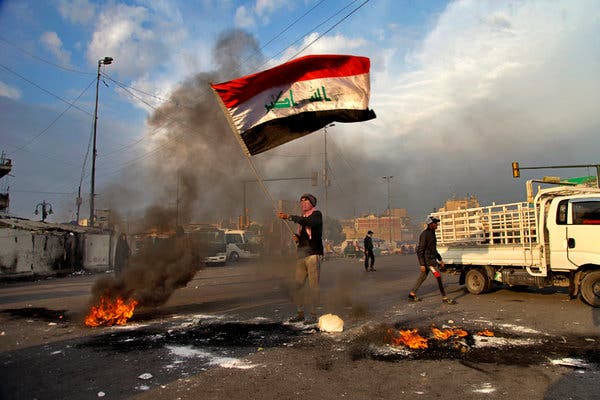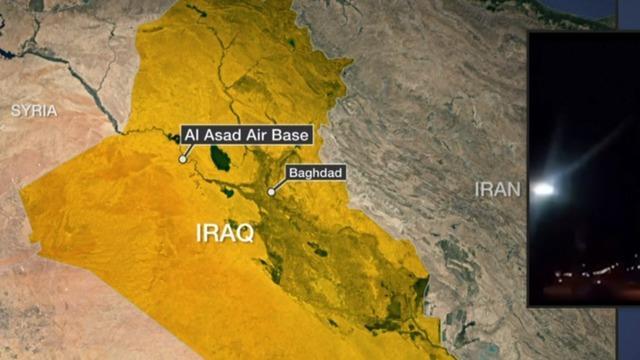- GOLD IRA
- Download Our 2024 Precious Metals IRA Investor’s Guide.
Click Here  Gold IRA
Gold IRA
 Investing
Investing
-
- CRYPTO IRA
- PRICES & STATS
- RETIREMENT PLANS
- BLOG
 Questions? Call (888) 820 1042
Questions? Call (888) 820 1042
Outbreak of Hostilities with Iran Destabilizes Middle East
Disclosure: Our content does not constitute financial advice. Speak to your financial advisor. We may earn money from companies reviewed. Learn more
Last Updated on: 10th January 2020, 02:16 pm

This past week saw the longstanding shadow war in the Middle East between the U.S. and Iran become an escalating conflict. After attacks on the U.S. Embassy in Iraq, America responded by killing the most powerful military figure in Iran, noted mastermind terrorist and General Soleimani. The situation escalated into missiles fired at U.S. airbases and threats made against U.S. and allied forces around the region. Of great concern is the question surrounding the United States' ability to keep peacekeeping troops in Iraq that are ensuring ISIS does not regroup.
U.S. Kills Terrorist and Top Ranking Iranian General Soleimani in Air Strike
The United States Secretary of State Mike Pompeo gave interviews over the weekend concerning the air strike that killed Iran's top general Qassem Soleimani. Pompeo claimed that destroying the leader had helped to make the world a safer place. Pompeo's remarks were notable in his ABC “This Week” interview that aired after certain senior level officials in the White House expressed skepticism over the motives for the drone strike that followed the Iranian-sponsored violence throughout Iraq. Pompeo stated to George Stephanopoulos that:
“The intelligence assessment made clear that no action – allowing Soleimani to continue his plotting and his planning, his terror campaign – created more risk than taking the action that we took last week. This was a bad guy, we took him off the playing field. And that's important because this was a fella who was the glue, who was conducting active plotting against the United States of America, putting American lives at risk.”
U.S. President Donald Trump warned the Iranian Republic not to engage in retaliation against America over the country killing Iran's top ranking general. Last Saturday Trump warned Tehran that if it exacted revenge, the United States would then strike back at 52 sites that were involved with the American hostages “taken by Iran many years ago.”
Retaliation Continues from Angry Iraqi and Iranian Regimes
Retaliation appeared to be in the air despite the threats of severe military reprisals. The Iranian Supreme Leader Ayatollah Ali Khamenei promised “severe revenge” for the United States. President Trump's administration then sent thousands more troops into the Middle East in an effort to protect U.S. troops and military installations.
Meanwhile Iran's streets saw hundreds of thousands of individuals come out to mourn for General Soleimani. Iranian parliament members appeared on state television chanting the words “Death to America!” from the chamber. Pompeo was still optimistic that the Iranians would not retaliate vigorously with his comments:
“It may be that there's a little noise here in the interim, that the Iranians make a choice to respond. I hope that they don't. President Trump has made clear what we will do in response if they do, that our response will be decisive and vigorous, just as it has been so far.”
The situation became more complicated when the Iraqi parliament Sunday passed a resolution that was nonbinding calling for the central government to eject all foreign troops from Iraq. After the parliament voted their wish to expel all American troops from Iraq, the United States' continuing military presence in the region became jeopardized.
In Lebanon, the terrorist Hezbollah group warned that the U.S. military personnel in the Middle East “will pay the price” for the death of the the top Iranian general. Their leader Hassan Nasrallah declared that soldiers, warships, and bases of the Middle East could all be considered fair targets for retaliation following the drone strike on General Soleimani who had been the architect of countless terrorist activities and area military campaigns over the past several years.
Iran-backed initial retaliation came later on Sunday. More than three explosions rocked Baghdad with warning sirens ringing out over the Tigris River. At first the blasts were guessed to be mortars or rockets that had fallen within the intensely fortified Green Zone that houses the Iraqi government and American and other embassies. This was the more serious of two attacks on the safe zone.
According to ABC news, on Wednesday Iran fired off over a dozen of its ballistic missiles against two American military bases in Iraq as the retaliation continued. No Americans or Iraqis were killed in the attack on Ain As-Asad and Erbil bases. The map of Iraq below shows some of the missile attack sites:

President Trump gave credit to the “dispersal of forces and an early warning system” that ensured there were no casualties. At this point on Wednesday, President Trump spoke as if to de-escalate the expanding military crisis with Iran. He declared that :
“Iran appears to be standing down… The U.S. is ready to embrace peace with all who seek it.”
This did not mean that there will not be additional reprisals though. Trump stated that no current plans for additional military strikes existed, but that additional economic sanctions for the Islamic Republic were likely coming.
U.S. Troops Leaving Iraq Would Open Return of ISIS
The greatest immediate repercussions appear to be that U.S. troops scheduled to remain in Iraq to fight remnants of ISIS may have to leave. The Iraqi parliament's resolution to expel U.S. troops requests that the central government cancel the agreement with America that has allowed Americans soldiers to remain for the last over four years. This bill still would have to be approved by the Iraqi government, but it has already secured the support of the outgoing Iraqi prime minister. Fears are growing that the end of the American military presence will mean the Islamic State will resurge in the country and potentially neighboring Syria.
These threats and retaliation have already caused the U.S. military to halt the fight against ISIS militants. The American-led coalition stated last Sunday that it will concentrate its efforts on safeguarding its bases and troops with threats for revenge from Hezbollah and Iran still hanging in the air.
Meanwhile Iraqi Prime Minister Adel Abdul-Mahdi gave a rousing speech before his lawmakers in the parliament. He declared that the government has only two choices before it. It could restrict foreign troops' mandate to training up Iraqi forces or remove all foreign troops from the country. He argued for “urgent measures” to get rid of the foreign forces and the approximately 5,200 American soldiers. Secretary of State Pompeo responded to the Iraqi debate with:
“It is the United States that is prepared to help the Iraqi people get what it is they deserve and continue our mission there to take down terrorism from ISIS and others in the region.”
If history is any guide, what happened in 2011 should be a warning. After American troops left Iraq that year, ISIS expanded rapidly everywhere, especially to the country's north and west. The U.S. soldiers returned after the Iraqi government asked them to come back in 2014 to fight the Islamic State and recapture the second biggest city in Iraq— Mosul. It was the American-led coalition that helped Iraqi forces and Iranian-supported militias to recover and push ISIS out of the country, though this required an expensive and lengthy three year campaign.
A Recovery of ISIS Threatens the Region and World
Now analysts are warning that the removal of U.S. troops would not only crush the ongoing fight against the dispersed Islamic State but allow it to enjoy a recovery and even retake territory. The militants associated with ISIS regularly sponsor attacks in the west and north of Iraq from their hideouts in the mountainous and desert regions there. Iraqi forces depend on the U.S. military for weapons and logistical support. Another danger is that the U.S. troop withdrawal would allow Iran to increase its power over Iraq, as both are made up of a majority Shiite population.
Unfortunately the news from the Middle East this past week has been destabilizing. It argues for why gold makes sense in an IRA today. IRA-approved gold is a well-known vehicle for diversifying retirement accounts. Nowadays there are many Gold IRA storage options. You can read more about the Top Gold IRA companies to learn more.



 Silver
Silver Gold
Gold Platinum
Platinum Palladium
Palladium Bitcoin
Bitcoin Ethereum
Ethereum

 Gold: $2,387.15
Gold: $2,387.15
 Silver: $27.92
Silver: $27.92
 Platinum: $931.02
Platinum: $931.02
 Palladium: $903.43
Palladium: $903.43
 Bitcoin: $67,910.26
Bitcoin: $67,910.26
 Ethereum: $3,278.81
Ethereum: $3,278.81